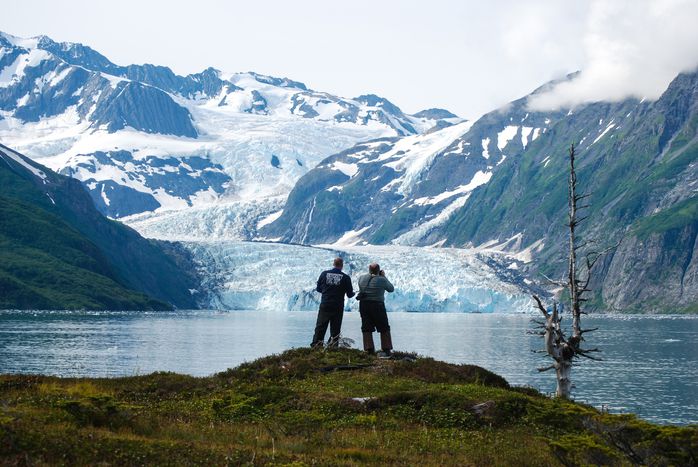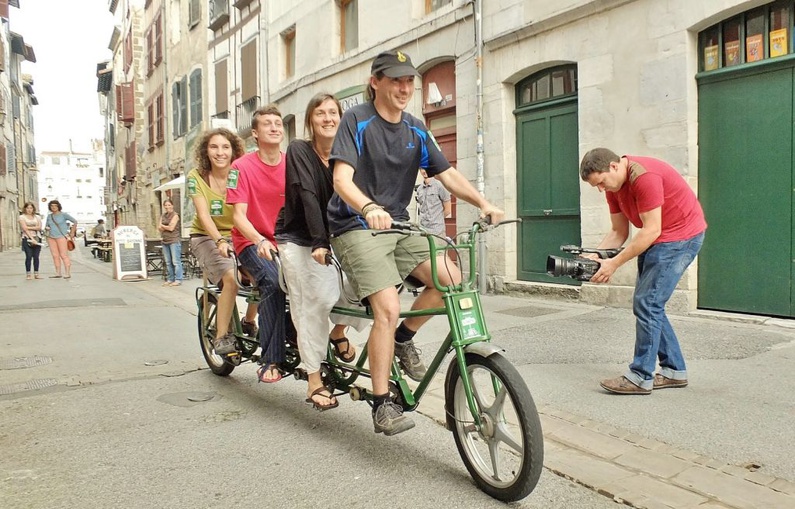
Alternatiba: the bike tour creating climate awareness
Published on
In the lead up to COP21, several organisations have been actively building on the theme of how to save the environment through multidimensional activities to raise consciousness about the climate crisis. Alternatiba has been giving people the opportunity to experience real alternatives to avert climate change since its first Village des alternatives, in Bayonne (France), in October 2013.
Pedalling on their emblematic four-person quadricyles, the 2015 Tour Alternatiba kicked off on 5 June in Bayonne and will completely encircle France before turning inland to reach Paris on 26 September, ahead of the COP21, which starts in November. Under the aegis of Coalition Climat 21 (Climate Coalition 21) and the slogan, “Our children will thank us,” the travelling caravan will bring educational villages to real villages throughout the country, providing diverse forms of instruction, information and discussion about climate change.
COP21: a turning point on climate change
November 30 will mark the start of the 21st annual climate summit, or Conference of the Parties (COP) to the 1992 Framework (UNFCCC). It's the 11th Meeting of the Parties (CMP or MOP), since the 1997 Kyoto Protocol, which was the treaty that was supposed to come into force in 2005, but United States never ratified it while Canada initially agreed, but later withdrew, with the ascension of its Conservative Party and the exploitation of the Alberta tar sands.
The other yearly COP meetings haven’t been much more productive in terms of achieving their objective of reducing greenhouse gas emissions. Copenhagen in 2009 (COP15/MOP5) was considered a failure by all sides as absolutely nothing was agreed, with the true extent of the behind-the-scenes shenanigans coming out in 2014 in documents released by Edward Snowden. COP19 in Warsaw saw the mass withdrawal of hundreds of NGOs, social movements and civil society organisations. As the COP process devolves, the carbon credit market has taken off, wherein players dispassionately toss and trade the ability to pollute like poker chips on a macabre international craps table.
Last year, in parallel to COP20 in Lima, Peru, the Cumbre de los pueblos (The People's Summit) was held. These People's Summits have been weaving in and out of the various international summits held in Latin America, like the 6th Summit of the Americas in Cartagena and Rio+20. A statement by the Cumbre, delivered to the COP20 in December 2014, denounced the collusion of governments and big business.
“The major transnational corporations ‘accompany’ governments in global negotiations to reach accords which are solely aimed at whitewashing industrialised countries’ responsibilities for their greenhouse gas emissions and the fact that they are the principal ones responsible for climate change.”
According to Maxime Combes of Attac-France, in an article published at the Cumbre, “if any accord is possible in 2015, it will be neither legally binding nor commensurate with what’s at stake.” Combes goes on to describe how President Obama “clearly asserted last summer that he prefers a flexible legal mechanism that invites States to define for themselves and announce, at regular intervals and unilaterally, their own commitments (emissions reductions, financing, etc.) over a given period.”
"Change the system, not the climate"
Faced with the urgency of the climate situation and the absurdity of proposals being made by world leaders and decision-makers, Coalition Climat 21’s mission is to enable organisations who wish to sensitise the public to these issues, unmask COP players, and provide real and concrete alternative ways to combat climate change. Translation and local mobilisation coordinator Louise Peltier writes, “The Coalition's aim is to be a platform for national and international organisations to meet, discuss, and coordinate around dates, places and narratives of action, as well as to mobilise citizens and raise general climate awareness. It is not a new organisation, but a place for coordination, created by different NGOs who felt they needed such a place to be as effective as possible for COP21 and beyond." Alternatiba's motto is to "change the system, not the climate."
The troubadours of the ambitious Tour Alternatiba are organising themselves along four major themes: Food, Energy, Economics and Finance, and Democracy, with space for other ideas that don't fit easily into those categories. Coalition Climat 21 is planning almost 600 events to inform and educate.
There are literally countless alternatives that can be employed to save the planet, from measures to simply consume less -- walk instead of drive, grow instead of buy, turn off the water when it’s not in use – to more complex systemic changes to governance, economy and society. Is it going to work? It has to because if not, the alternative is too terrible to imagine.
Danica Jorden is a writer and translator of French, Spanish, Portuguese and Italian.



